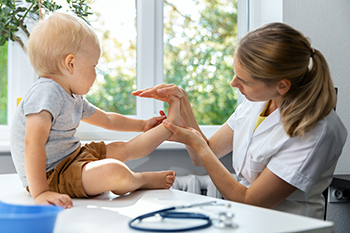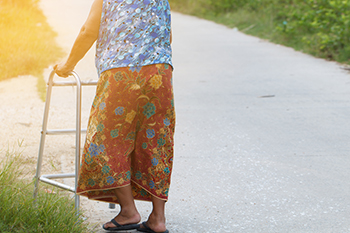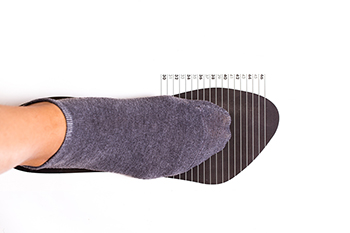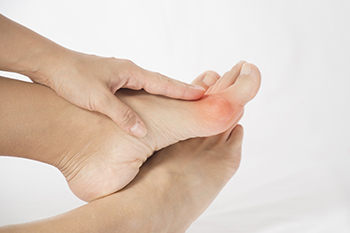Items filtered by date: March 2022
The Benefits of Wearing Flip Flops
 Many people enjoy wearing flip flops for their various colors and simplicity. There are benefits that avid flip flop wearers recognize, including their versatility, comfort, and relaxing qualities. Additionally, they allow the feet to breathe, and the toes typically have adequate room to wiggle in. They are easy to wear for their lack of laces, and can be good for children who have not learned how to tie shoes. There are some flip flops that are designed with an arch, in addition to being made of comfortable material. Many people enjoy wearing them to the beach, pool, or performing local errands. Of course, while there are benefits there can also be risks, such as blisters. Staggering how often you wear them can help avoid this. If you would like to learn about how wearing flip flops may be good for your feet, a podiatrist can provide you with the necessary information.
Many people enjoy wearing flip flops for their various colors and simplicity. There are benefits that avid flip flop wearers recognize, including their versatility, comfort, and relaxing qualities. Additionally, they allow the feet to breathe, and the toes typically have adequate room to wiggle in. They are easy to wear for their lack of laces, and can be good for children who have not learned how to tie shoes. There are some flip flops that are designed with an arch, in addition to being made of comfortable material. Many people enjoy wearing them to the beach, pool, or performing local errands. Of course, while there are benefits there can also be risks, such as blisters. Staggering how often you wear them can help avoid this. If you would like to learn about how wearing flip flops may be good for your feet, a podiatrist can provide you with the necessary information.
Flip-flops are not always the best choice of footwear. If you have any concerns about your feet or ankles, contact one of our podiatrists from PA Foot & Ankle Associates. Our doctors will assist you with all of your foot and ankle needs.
Flip-Flops and Feet
When the weather starts warming up, people enjoy wearing flip-flops. Flip-flops are comfortable, stylish, and easy to slip on and off; they're perfect for any summer beach goer. However, these shoes can cause harm to the feet.
How Can Flip-Flops Affect Me Long-Term?
- Ankle problems
- Hip problems
- Lower back problems
- Pain in the balls of the feet
- Problems with foot arches
- Changes in the way you walk
Are There Injuries Associated with Flip-Flops?
Yes. Since flip-flops are relatively weak and do not provide the same amount of support as sneakers, people who wear flip-flops regularly are more susceptible to injuries. On top of that, the open nature of the shoe makes your feet more prone to other problems, such as cuts and even infections. Common injuries and ailments include:
- Sprained ankles
- Blisters
- Infections
- Cuts and Scrapes
I like Wearing Flip-Flops. Are There Safe Alternatives?
When buying flip-flops, try to find ones that have sturdy soles and that are made of high-quality materials that will support for your feet. These flip-flops will cost more but will also last longer as a result.
If you have any questions please feel free to contact one of our offices located in Allentown, Easton, Northampton, and Chew Street in Allentown, PA . We offer the newest diagnostic and treatment technologies for all your foot and ankle needs.
How to Take Care of Your Baby’s Feet
 Your baby will be depending on his or her feet for a lifetime, so it makes sense to begin their life trying to make sure their feet are properly cared for. Under most circumstances, babies are born with feet that are normal and healthy and good care can keep them that way. Things that can be done to keep baby’s feet in good condition include: allowing free and active movement to ensure good muscle development, barefoot crawling indoors so feet and toes continue to develop normally, frequent checking on the proper fit of socks and shoes (especially given how quickly they grow), washing their feet every day with soap and water and drying them thoroughly, and not rushing baby’s walking in any way, including providing walking aids, which might cause injury. Consulting with a podiatrist is suggested if anything concerning or questionable arises with your baby’s feet for immediate diagnosis and proper treatment recommendations, e.g., toes turning in or out a lot, shoes wearing unevenly, rashes, bumps or lumps developing on their feet, or they complain of continual foot pain.
Your baby will be depending on his or her feet for a lifetime, so it makes sense to begin their life trying to make sure their feet are properly cared for. Under most circumstances, babies are born with feet that are normal and healthy and good care can keep them that way. Things that can be done to keep baby’s feet in good condition include: allowing free and active movement to ensure good muscle development, barefoot crawling indoors so feet and toes continue to develop normally, frequent checking on the proper fit of socks and shoes (especially given how quickly they grow), washing their feet every day with soap and water and drying them thoroughly, and not rushing baby’s walking in any way, including providing walking aids, which might cause injury. Consulting with a podiatrist is suggested if anything concerning or questionable arises with your baby’s feet for immediate diagnosis and proper treatment recommendations, e.g., toes turning in or out a lot, shoes wearing unevenly, rashes, bumps or lumps developing on their feet, or they complain of continual foot pain.
The health of a child’s feet is vital to their overall well-being. If you have any questions regarding foot health, contact one of our podiatrists of PA Foot & Ankle Associates. Our doctors can provide the care you need to keep you pain-free and on your feet.
Tips for Keeping Children's Feet Healthy
- Make sure their shoes fit properly
- Look for any signs of in-toeing or out-toeing
- Check to see if they have Clubfoot (condition that affects your child’s foot and ankle, twisting the heel and toes inward) which is one of the most common nonmajor birth defects.
- Lightly cover your baby’s feet (Tight covers may keep your baby from moving their feet freely, and could prevent normal development)
- Allow your toddler to go shoeless (Shoes can be restricting for a young child’s foot)
- Cut toenails straight across to avoid ingrown toenails
- Keep your child’s foot clean and dry
- Cover cuts and scrapes. Wash any scratches with soap and water and cover them with a bandage until they’ve healed.
If you have any questions, please feel free to contact one of our offices located in Allentown, Easton, Northampton, and Chew Street in Allentown, PA . We offer the newest diagnostic and treatment technologies for all your foot care needs.
Why Live with Pain and Numbness in Your Feet?
Improve Your Choice of Footwear While Pregnant
As women gain weight during pregnancy, it is common for their legs and feet to begin swelling and aching. This is mainly a side-effect of the normal buildup of fluids in the body as the baby grows. Further, the center of gravity changes as the months go by, affecting the legs and feet and the way she walks and stands. Proper footwear is essential to help reduce discomfort or the chance of accidents or serious illness. Suggestions for changes in footwear during pregnancy include buying shoes at least a half size larger than normal, choosing shoes with high arch and ankle support, and wearing slip-ons rather than shoes that tie. Further, high heels should be avoided as much as possible, to reduce the chance of falling or twisting an ankle. Low and wider heels help distribute body weight better, and shoes with a wider toe box are a good idea for improved stability and comfort. If you have questions about foot health during pregnancy, it is wise to consult a podiatrist who can guide you in making the proper footwear decisions.
Pregnant women with swollen feet can be treated with a variety of different methods that are readily available. For more information about other cures for swollen feet during pregnancy, consult with one of our podiatrists from PA Foot & Ankle Associates. Our doctors will attend to all of your foot and ankle needs.
What Foot Problems Can Arise During Pregnancy?
One problem that can occur is overpronation, which occurs when the arch of the foot flattens and tends to roll inward. This can cause pain and discomfort in your heels while you’re walking or even just standing up, trying to support your baby.
Another problem is edema, or swelling in the extremities. This often affects the feet during pregnancy but tends to occur in the later stages.
How Can I Keep My Feet Healthy During Pregnancy?
- Wearing orthotics can provide extra support for the feet and help distribute weight evenly
- Minimize the amount of time spent walking barefoot
- Wear shoes with good arch support
- Wear shoes that allow for good circulation to the feet
- Elevate feet if you experience swelling
- Massage your feet
- Get regular, light exercise, such as walking, to promote blood circulation to the feet
If you have any questions please feel free to contact one of our offices located in Allentown, Easton, Northampton, and Chew Street in Allentown, PA . We offer the newest diagnostic and treatment technologies for all your foot and ankle needs.
Strong Bones and Falling
 Falling is known to be a common cause of injury in elderly people. This may be a result of weakened bones as the aging process evolves and can cause discomfort and stress. Many patients have developed a habit of walking daily, and bones may be strengthened by performing leg exercises. Additionally, it can help to get regular physical and eye examinations, and this can aid in preventing falling. There are preventative methods that can be implemented in the household that can lessen the number of falls. These include removing worn rugs, improving lighting, and using a shower mat in the bathroom. It is suggested that shoes with non-slip soles are worn, in addition to using a cane or walker, if needed. The feet may be affected by falling, and a fractured foot is not uncommon. If you would like to learn about how to prevent falling, please speak with a podiatrist who can answer any questions you may have.
Falling is known to be a common cause of injury in elderly people. This may be a result of weakened bones as the aging process evolves and can cause discomfort and stress. Many patients have developed a habit of walking daily, and bones may be strengthened by performing leg exercises. Additionally, it can help to get regular physical and eye examinations, and this can aid in preventing falling. There are preventative methods that can be implemented in the household that can lessen the number of falls. These include removing worn rugs, improving lighting, and using a shower mat in the bathroom. It is suggested that shoes with non-slip soles are worn, in addition to using a cane or walker, if needed. The feet may be affected by falling, and a fractured foot is not uncommon. If you would like to learn about how to prevent falling, please speak with a podiatrist who can answer any questions you may have.
Preventing falls among the elderly is very important. If you are older and have fallen or fear that you are prone to falling, consult with one of our podiatrists from PA Foot & Ankle Associates. Our doctors will assess your condition and provide you with quality advice and care.
Every 11 seconds, an elderly American is being treated in an emergency room for a fall related injury. Falls are the leading cause of head and hip injuries for those 65 and older. Due to decreases in strength, balance, senses, and lack of awareness, elderly persons are very susceptible to falling. Thankfully, there are a number of things older persons can do to prevent falls.
How to Prevent Falls
Some effective methods that older persons can do to prevent falls include:
- Enrolling in strength and balance exercise program to increase balance and strength
- Periodically having your sight and hearing checked
- Discuss any medications you have with a doctor to see if it increases the risk of falling
- Clearing the house of falling hazards and installing devices like grab bars and railings
- Utilizing a walker or cane
- Wearing shoes that provide good support and cushioning
- Talking to family members about falling and increasing awareness
Falling can be a traumatic and embarrassing experience for elderly persons; this can make them less willing to leave the house, and less willing to talk to someone about their fears of falling. Doing such things, however, will increase the likelihood of tripping or losing one’s balance. Knowing the causes of falling and how to prevent them is the best way to mitigate the risk of serious injury.
If you have any questions, please feel free to contact one of our offices located in Allentown, Easton, Northampton, and Chew Street in Allentown, PA . We offer the newest diagnostic and treatment technologies for all your foot care needs.
Top 9 Foot Care Tips for Elderly Adults
If you are a caregiver for an aging adult, helping them take care of their feet can help keep them healthy, active and improve their quality of life. Healthy feet can also help older adults avoid falls and broken bones. Here are the top nine things you can do to promote better foot health in an elderly person. 1) Inspect their feet daily for any redness, breaks in the skin or anything unusual. 2) Help them eat healthy foods, drink plenty of water, and engage in low impact exercise and stretching. 3) Trim their toenails straight across. 4) Make sure footwear fits properly, and have their feet measured for length and width every time they buy new shoes. 5) Don’t allow them to walk barefoot, even around the house. 6) Keep their feet clean, dry, and moisturized. 7) Make sure their socks are not tight to avoid cutting off circulation. 8) Never trim corns or calluses with a sharp instrument. 9) Have their feet checked regularly by a podiatrist, especially if they are diabetic.
If you need your feet checked, contact one of our podiatrists of PA Foot & Ankle Associates. Our doctors will attend to all of your foot and ankle needs and provide you with quality treatment.
Geriatrics and Podiatry
When people age, some common issues that may occur are bone density loss, dry skin, poor circulation, and rough brittle nails. These issues may also affect your foot health if the necessary steps are not taken to alleviate the problems.
It is important to take care of your feet because feet that are injured or diseased can affect your overall health. Having painful feet hinders your ability to do daily activities or may decrease your willingness to do the things that you need to do.
Visiting Your Geriatrician
As we age, health problems become more likely, so it is essential to visit your doctor for check-ups to ensure that you are doing the best you can to take care of your health. It is recommended to check your feet frequently for any possible cuts, bruises, swelling, corns or any other irregularities.
Taking Care of Elderly Feet
Cracked or dry feet can be treated by applying moisturizer often. It is also important not to wear old socks because the older the sock is, the higher the possibility there will be that there is bacteria there. Wear fresh socks and make sure they fit properly.
Proper foot health means that you can have a more active lifestyle and you will not be bogged down by pain. Foot health also leads to good circulation, which is paramount for overall health.
If you have any questions, please feel free to contact one of our offices located in Allentown, Easton, Northampton, and Chew Street in Allentown, PA . We offer the newest diagnostic tools and technology to treat your foot and ankle needs.



